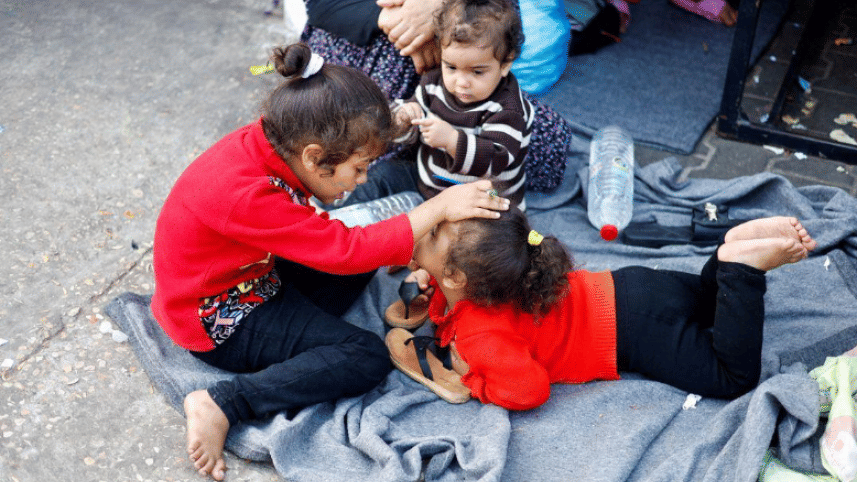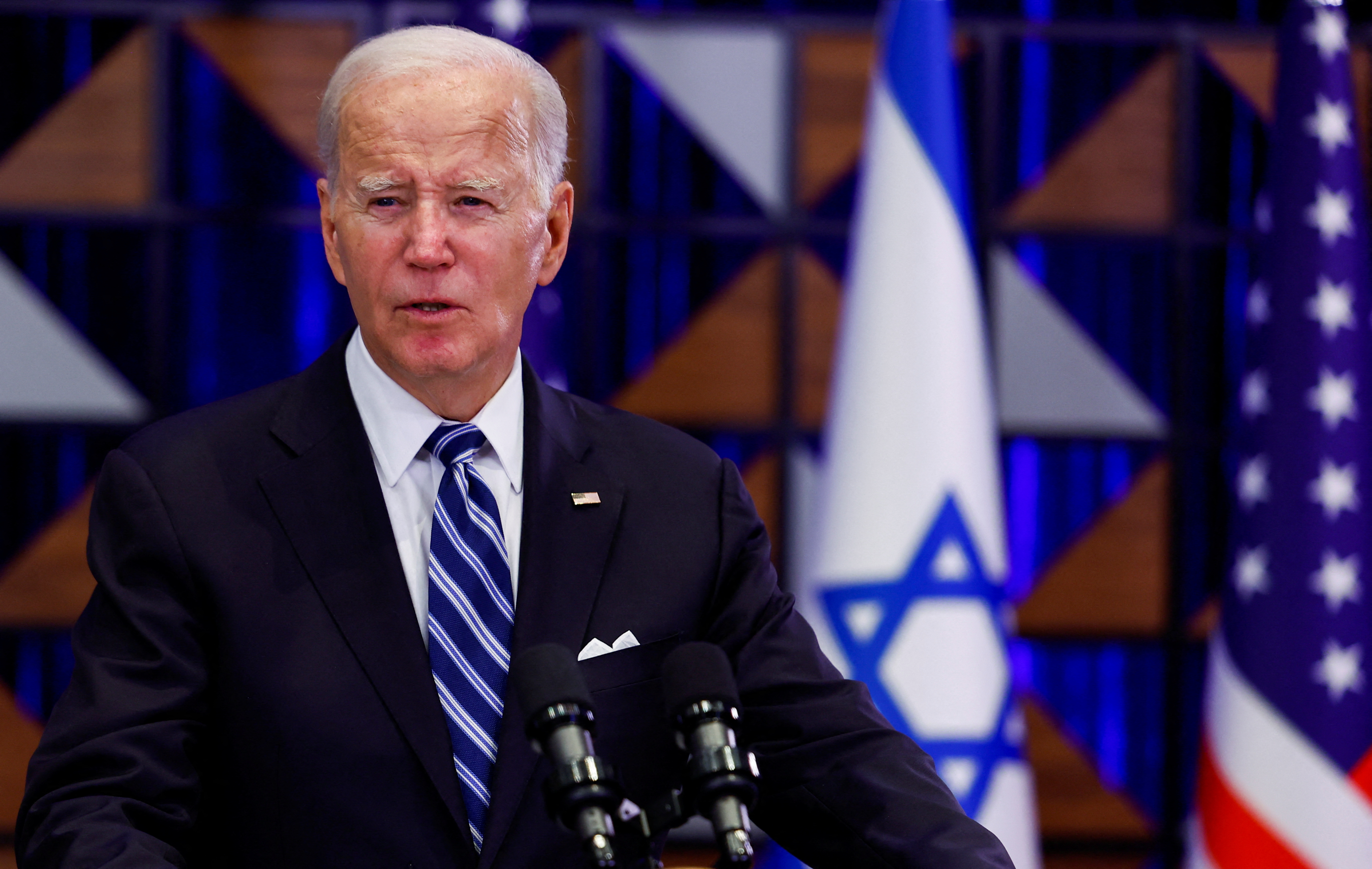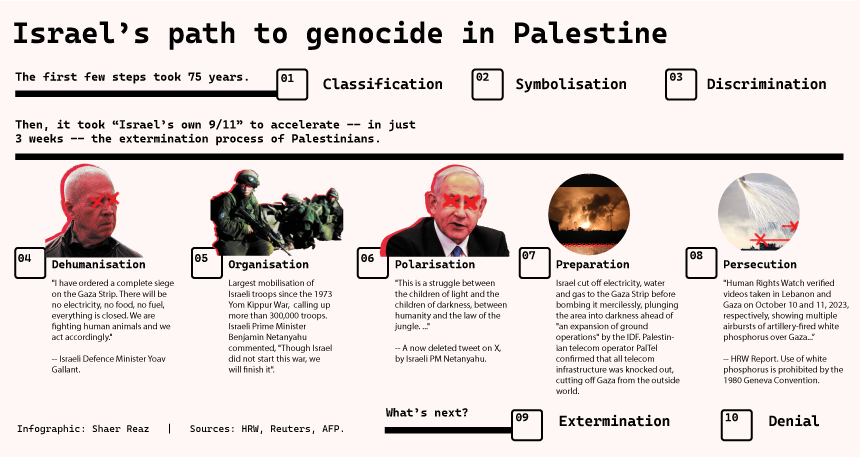The world in the eyes of Palestinian children

Palestinian men, women, and children have been subjected to mass murder for decades. This time around, since October 7, 2023, extensive Israeli aerial and ground attacks have killed nearly 30,000 of them (as of February 27, 2024). The number of casualties is increasing steadily with every passing day.
Let's not forget that tens of thousands of severely injured Palestinians are languishing without care, as the Israeli bombings have not spared even healthcare facilities. Many have suffered life-changing injuries and will have to live with physical and/or mental disabilities, if they survive. Bear in mind that, because of the imposition of Israeli blockade since 2007, a humanitarian crisis was already looming large in the Gaza Strip. Israel didn't need the October 7 incident as an excuse to impose that blockade and other repressive measures on Palestinians. What is worse is that the extreme human sufferings of Palestinians have become normalised in the eyes of many.
While one brutal murder is too many, this spike of Israeli violence against Palestinians has continued, killing innocent people in their thousands for months. We are not talking about a mass murder that happened in the pre-modern era when channels of communication were limited. Israeli forces have been mass-murdering Palestinians in full view of the world, via live-streaming at times. Therefore, ignorance is not an excuse for powerful nations to avoid meaningful steps to end hostilities or to enforce a ceasefire; for them, condoning Israel's gross human rights violations is a calculated, opportunistic choice.
Some powerful Western governments are providing Israeli forces with sophisticated weapons to carry out its mass murder campaign, while others have chosen to be silent observers. The hypocrites among world leaders seek to feed us with lip service and sugar-coated rhetoric of peace, or limit their responsibility to urging Israel to avoid civilian casualties. But under the surface, they concede to Israel's unquenchable thirst for Palestinian blood and land, while also earning profit from selling deadly weapons to Israel. As a result, it has been able to dispossess Palestinian landholders, eliminate the Palestinian presence in most parts of Palestine, and build illegal settlements in Palestinian lands by means of expulsion and land robbery—all without much international opposition.
The spectre of vulnerability, insecurity, suffering, and death of the Palestinians is a sore to our collective conscience and weighs heavy on our hearts. What is even more unbearable is to see children slaughtered in scores by Israeli air strikes or bombardments, or injured and abandoned due to the death of their parents and other family members. It is heart-wrenching to see Palestinian toddlers following their injured mothers who are running to safety.
People who have children of comparable age to those Palestinian children may find such media images more difficult to view and process. They are perhaps more likely to feel the sharp pinch of those children's suffering.
Many of the surviving children in Palestine, especially those in Gaza, have no idea why they have been attacked and killed day in and day out. Some of them may have seen—on TV—happy children going to school and running and playing. They may wonder why their lives are different and why their very existence is at stake, and why their schools as well as their houses are bombed.
Some older Palestinian children may have read about powerful countries that talk about human rights, rule of law, international humanitarian law, and the sanctity of human life. They may wonder why all these normative values have no meaning or relevance for them. Many Palestinian children may have heard about the International Court of Justice and may have anticipated that it would pass a powerful verdict that would put moral pressure on world leaders to intervene and stop Israel from killing their loved ones. They may have been disillusioned by the actual ICJ ruling that seemed to have given Israel the free pass to kill as long as it can avoid the charge of genocide.
These Palestinian children know a world that has little regard and respect for their lives and for the lives of their parents and other loved ones. They live in a land where their houses can be demolished by Israeli bombings or bulldozers and their properties expropriated by the Israeli government at any time. The world that they know intimately is one where their mothers put each of their siblings in a different room to sleep in a vain attempt to at least save some of them from Israeli bombs at night.
The world that Palestinian children know is full of checkpoints, control systems, and multiple walls of separation. As a result, their movement is severely restricted and they are constantly under the spotlight of Israeli surveillance. The children, their parents, siblings, or others in the community can be picked and put in Israeli dungeons at any moment, where they suffer further humiliation for indefinite periods of time.
For decades, Palestinian children have seen Israeli forces and settlers dishonouring their mothers and sisters, humiliating their fathers and torturing their brothers. They have seen their older siblings discontinue education because their universities have been destroyed by Israeli bombs. They have seen their fathers coming back home with bloodstained clothing because their mosques were bombed while people were worshipping. Palestinian children see their elder siblings not coming back home because they were picked up by the Israeli forces. Against all such gross violations of human rights, they have not seen any legal protection.
The Israeli mistreatment that Palestinians experience on a regular basis started in a major way in 1948 when the state of Israel was founded on Palestinian land. Therefore, those who are adults in present-day Palestine had a similar childhood and have lived their whole lives under Israeli occupation. Thus, Israel and its international backers are failing the Palestinian children of today, as they failed their parents and grandparents in the past decades. Their humanity is taken away in the same way as it was taken away from their forebears.
The multigenerational Palestinian crisis has remained a blot on the global conscience. One honourable way to remove this blot is to restore the humanity and dignity of Palestinians. The sooner it is done, the better for us all. It will remove an element of hypocrisy from the international order shaped and regulated by former colonial powers.
Md Mahmudul Hasan, PhD is a professor of English at the International Islamic University Malaysia. He has edited (with Mohammad A Quayum) 'Bangladeshi Literature in English: Critical Essays and Interviews.' He can be reached at mmhasan@iium.edu.my
Views expressed in this article are the author's own.
Follow The Daily Star Opinion on Facebook for the latest opinions, commentaries and analyses by experts and professionals. To contribute your article or letter to The Daily Star Opinion, see our guidelines for submission.




 For all latest news, follow The Daily Star's Google News channel.
For all latest news, follow The Daily Star's Google News channel. 


Comments